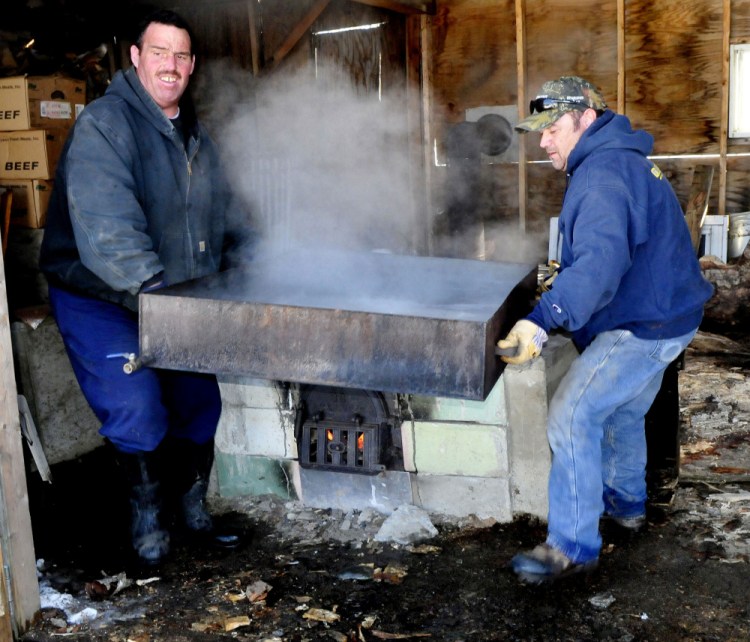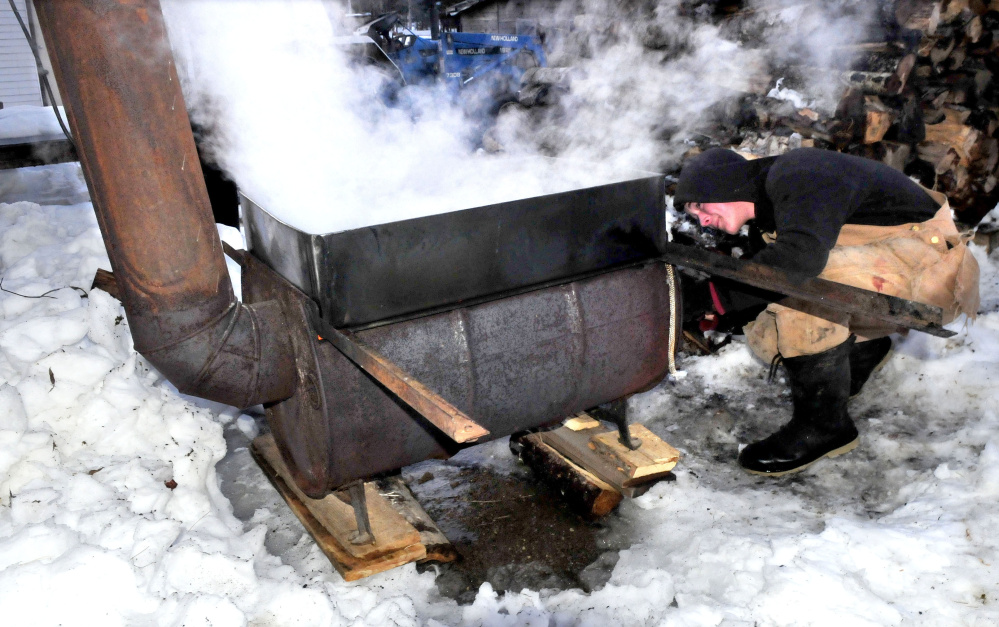The sap has already been flowing for some central Maine farmers, but others are holding off tapping trees as maple sugaring season ramps up.
Anthony Corson, the owner of Corson Farms LLC in Norridgewock, began tapping his 4,000 maple trees this past week.
“I’m a little behind, but I should be all tapped out today,” Corson said Thursday afternoon.
The end of February and beginning of March can be a mixed bag. Following massive snowstorms earlier in the month, the tail end of February has brought mild temperatures but little precipitation.
Mid to late February, and even into early March, is typically when maple trees can be tapped for the sap used to produce maple syrup. Sap tends to flow when daytime temperatures are above 32 degrees and when nighttime temperatures dip back below freezing, and temperatures this past week have peaked in the high 40s during the day and dipped back to the low 30s or 20s at night. The season typically lasts until warmer weather prevails.
Nate St. Saviour of Sap Hound Maple Co.in Brownfield, who serves as vice president of the Southern Maine Maple Sugarmakers Association, said he got off to an unusually early start this season. He started installing 1,400 taps on Jan. 20 and has already made about 100 gallons of the 700 gallons of maple syrup he hopes to produce this year.
“We’re running full steam ahead. Any time you’re doing anything in January, that’s considered early,” he said. “The middle of February is when people get ramped up.”
At an association meeting last week, about half of the members said they already had started tapping and making syrup, while the other half are gearing up to get out there soon, St. Saviour said. Traditionally, producers didn’t start boiling syrup until March, but in recent years early thaws have created ideal conditions for a sap run in January and February.
The state’s attention turns to maple sugaring season on Maine Maple Sunday, which is March 26 this year. Organized by the Maine Maple Producers Association, the event involves some 100 participating producers statewide opening up their sugarhouses for tours, demonstrations, samples and sales.
Maine’s maple syrup industry, which is the third-largest in the nation, contributes nearly $30 million directly to the Maine economy each year, according to a University of Maine study. The industry generates more than 500 full- and part-time jobs and about $17 million in labor income.
Corson said the seasonal timing of tapping often depends on the size of the operation. Some of the larger farms with tens of thousands of taps tend to start earlier, as early as January, Corson said, while smaller outfits tend to wait.
“Normally it’s the middle of February for me,” he said.
Steve Lemieux, of The Old Sugarhouse in Fairfield, said he won’t begin tapping until March 6. That’s because The Old Sugarhouse, in addition to producing maple syrup, also has a number of other functions. Lemieux said they will continue to provide sleigh rides until March 5.
Diane Haulk, of Haulk’s Maple in Madison, said they have not begun tapping yet, in part because the sap hasn’t started running for them but also because of a snow plowing issue. She said they probably have about 2,500 taps, and tapping times can vary. Trees that get more sun can be tapped earlier, while maple trees that are more wooded — like at Haulk’s Maple — tend to take longer.
“We’re hoping the next couple weeks,” she said. “We’re not too worried”
Once the sap has been collected, the water in the sap is boiled off leaving a high concentration of sugar — maple syrup. The syrup is filtered and reheated for packaging and is graded according to several shaes of color, darker being a stronger flavor than lighter. To produce maple sugar confections, the sap is boiled down further. It’s a lot of work for a relatively short season.
Corson said that typically the season lasts about six weeks and ends at the end of March or beginning of April, but it may vary at the beginning or end of the season depending on “whatever Mother Nature throws at you. It is a very short season.”
Portland Press Herald staff writer Bob Keyes contributed reporting.
Colin Ellis — 861-9253
cellis@centralmaine.com
Twitter: @colinoellis
Send questions/comments to the editors.





Success. Please wait for the page to reload. If the page does not reload within 5 seconds, please refresh the page.
Enter your email and password to access comments.
Hi, to comment on stories you must . This profile is in addition to your subscription and website login.
Already have a commenting profile? .
Invalid username/password.
Please check your email to confirm and complete your registration.
Only subscribers are eligible to post comments. Please subscribe or login first for digital access. Here’s why.
Use the form below to reset your password. When you've submitted your account email, we will send an email with a reset code.